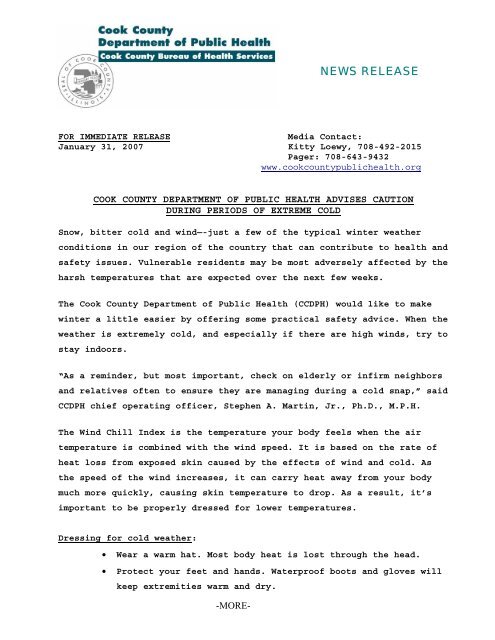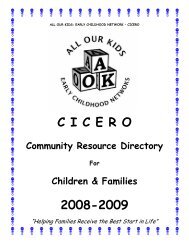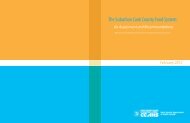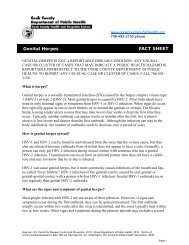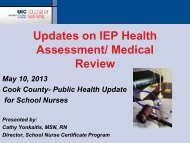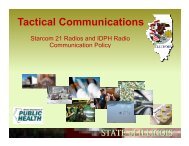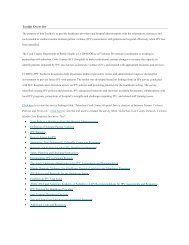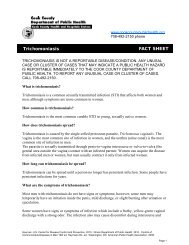CCDPH Advises Caution During Periods of Extreme Cold
CCDPH Advises Caution During Periods of Extreme Cold
CCDPH Advises Caution During Periods of Extreme Cold
You also want an ePaper? Increase the reach of your titles
YUMPU automatically turns print PDFs into web optimized ePapers that Google loves.
NEWS RELEASE<br />
FOR IMMEDIATE RELEASE<br />
Media Contact:<br />
January 31, 2007 Kitty Loewy, 708-492-2015<br />
Pager: 708-643-9432<br />
www.cookcountypublichealth.org<br />
COOK COUNTY DEPARTMENT OF PUBLIC HEALTH ADVISES CAUTION<br />
DURING PERIODS OF EXTREME COLD<br />
Snow, bitter cold and wind—-just a few <strong>of</strong> the typical winter weather<br />
conditions in our region <strong>of</strong> the country that can contribute to health and<br />
safety issues. Vulnerable residents may be most adversely affected by the<br />
harsh temperatures that are expected over the next few weeks.<br />
The Cook County Department <strong>of</strong> Public Health (<strong>CCDPH</strong>) would like to make<br />
winter a little easier by <strong>of</strong>fering some practical safety advice. When the<br />
weather is extremely cold, and especially if there are high winds, try to<br />
stay indoors.<br />
“As a reminder, but most important, check on elderly or infirm neighbors<br />
and relatives <strong>of</strong>ten to ensure they are managing during a cold snap,” said<br />
<strong>CCDPH</strong> chief operating <strong>of</strong>ficer, Stephen A. Martin, Jr., Ph.D., M.P.H.<br />
The Wind Chill Index is the temperature your body feels when the air<br />
temperature is combined with the wind speed. It is based on the rate <strong>of</strong><br />
heat loss from exposed skin caused by the effects <strong>of</strong> wind and cold. As<br />
the speed <strong>of</strong> the wind increases, it can carry heat away from your body<br />
much more quickly, causing skin temperature to drop. As a result, it’s<br />
important to be properly dressed for lower temperatures.<br />
Dressing for cold weather:<br />
• Wear a warm hat. Most body heat is lost through the head.<br />
• Protect your feet and hands. Waterpro<strong>of</strong> boots and gloves will<br />
keep extremities warm and dry.<br />
-MORE-
NEWS RELEASE<br />
• Cover as much <strong>of</strong> your face as possible while outside, breathe<br />
through a fluffy scarf to warm air before it enters lungs.<br />
• Wear several layers <strong>of</strong> lightweight clothing rather than one or<br />
two layers <strong>of</strong> heavy garments. The air between the garments<br />
acts as insulation to keep the body warmer.<br />
• Be prepared for signs <strong>of</strong> frostbite. Skin that turns whitish,<br />
stiff or numb should be warmed gradually. Wrap the area in<br />
blankets, sweaters, coats, etc. Do not rub affected area or<br />
apply snow to frostbite. Seek medical attention immediately.<br />
Shoveling snow:<br />
• <strong>Cold</strong> weather strains the heart <strong>of</strong> even those in good shape. If<br />
you are strong enough to handle shoveling, make sure you rest<br />
<strong>of</strong>ten and pace yourself. Or if you are not in good shape, ask<br />
for help from a physically fit neighbor, friend or relative.<br />
• Use a proper snow shovel and lift with your legs, not your<br />
back.<br />
Auto safety:<br />
• Keep your car in good condition by making sure you have enough<br />
gas, antifreeze, windshield wiper fluid and oil.<br />
• Carry emergency supplies, including a flashlight and<br />
blanket.<br />
In the home:<br />
• Never use an oven as a heating device. Read all directions<br />
before using space heaters and other portable heating units.<br />
• Make sure cracks in windows and doors are repaired. For a<br />
quick fix, use towels, rugs or newspapers.<br />
• Keep an emergency supply <strong>of</strong> bottled water and canned and other<br />
non perishable foods along with batteries and flashlights in<br />
2
NEWS RELEASE<br />
case you are stranded at home. Make sure baby foods, diapers and<br />
medicines are included in your supply.<br />
For your health:<br />
• Drink caffeine-free, non-alcoholic beverages such as decaffeinated<br />
c<strong>of</strong>fee, tea, hot chocolate and soup to stay warm<br />
and hydrated.<br />
• Check with your doctor or pharmacist about medications that<br />
could cause problems in cold weather.<br />
Residents <strong>of</strong> suburban Cook County should check with their local<br />
municipalities and townships for warming center information.<br />
For more information, contact <strong>CCDPH</strong> at 708-492-2000 or<br />
www.cookcountypublichealth.org.<br />
Other resources include:<br />
www.ready.gov/america/beinformed/winter.html<br />
TDD for hearing/speech impaired: 708-492-2002.<br />
###<br />
3


